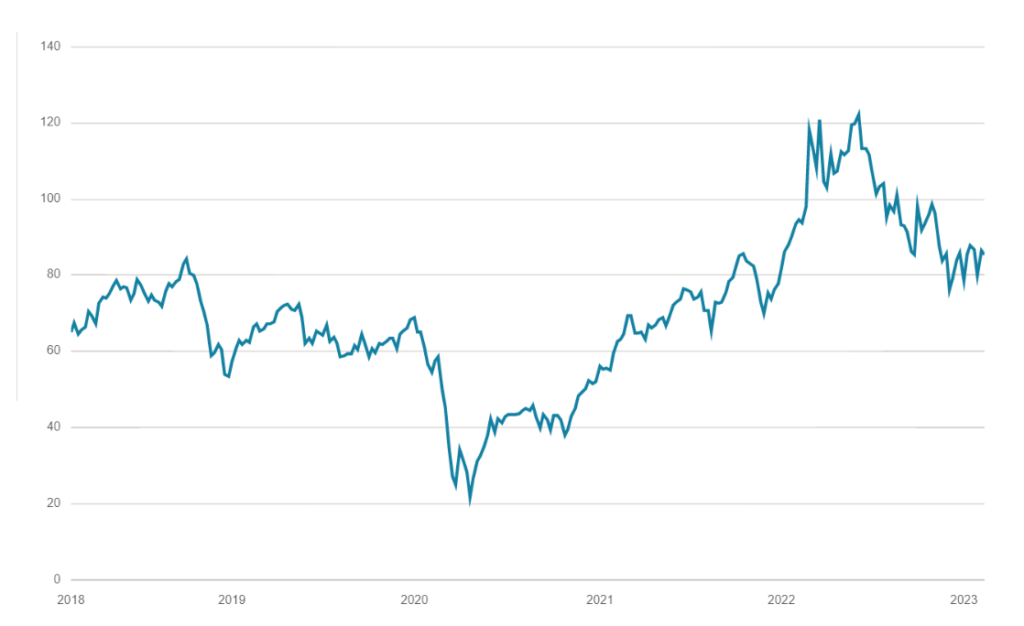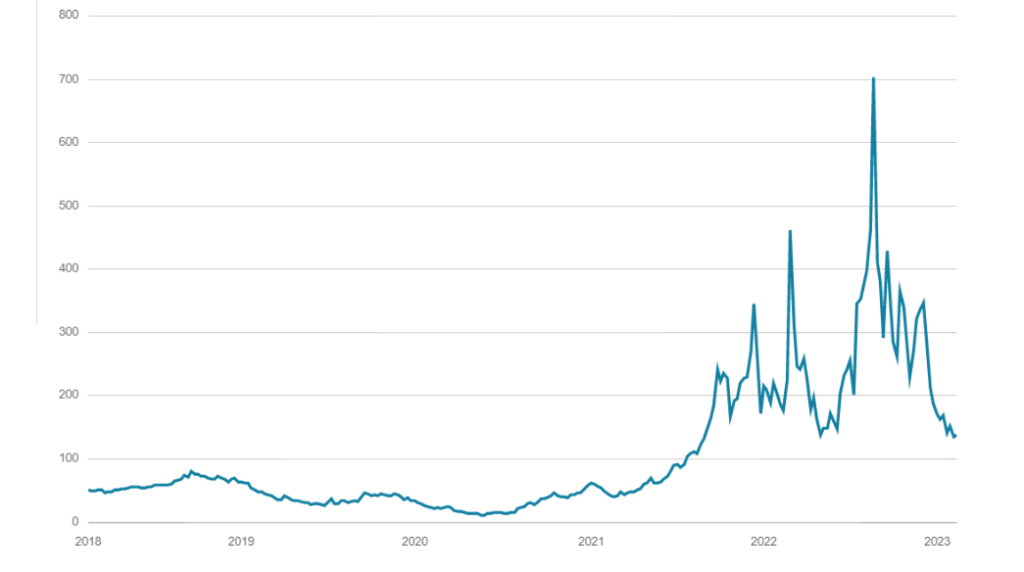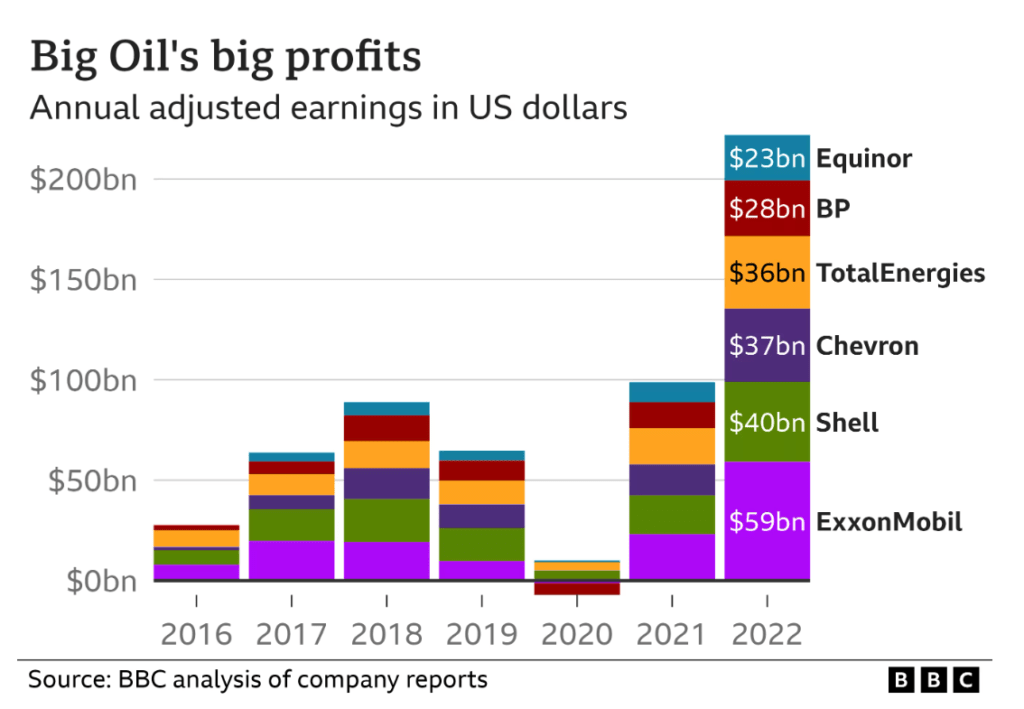By John Pickard
It is hardly surprising that there are calls being made for additional taxes on oil and gas corporations, given that they are all recording record profits this winter. While ordinary people are suffering more energy poverty that they have felt in their lifetimes, the shareholders of big energy companies are having a party.
The war in Ukraine resulted in a cut in supplies of oil and gas from Russia to Western Europe, but that reduction is not at all commensurate with the huge surge in prices, which has more to do with market mechanisms and profiteering than it has to do with supply issues. In fact, oil and gas prices on international markets are today barely above the levels three years ago, well before the war in Ukraine.

The most recent big oil company to declare record profits was BP. Its profits more than doubled to nearly $28bn in 2022. Before that, Shell reported record profits, of almost $40bn, the biggest in its 115-year history. And the week before that, ExxonMobil (Esso in the UK) announced reported a profit of $55.7bn for 2022, the highest annual earnings for any western oil company. ExxonMobil’s US rival Chevron, ‘only’ made $36.5bn.
A handful of giant corporations made an eye-watering $200bn in profit in the last year (see chart). It will not have gone unnoticed by ordinary workers that this profiteering has gone on and even US president Joe Biden referred to this total as “outrageous”, but he only says that to maintain his faint image of ‘radicalism’.

Poorest workers choosing between heating and eating
Right across Europe and North America, ordinary workers are suffering mammoth rises in energy prices and the poorest workers have to choose between heating and eating. In April, energy prices are set to leap again. But for the tiny proportion of the population who are the shareholders of these big companies, they are wallowing in a waterfall of cash thrown from dividends and share buy-backs.
Another company registering record profits and is Britain’s biggest provider of natural gas, Equinor, making the biggest profits in its 51-year history. According to the Guardian (February 8), “Equinor raised its quarterly dividend and said it expects to hand $17bn to shareholders in 2023.”
This company is actually two-thirds owned by the Norwegian government and it is a source of its revenue. It is outside the scope of this article, but it is worth noting, as an aside, that Norway’s exploitation of oil and gas over the decades, unlike that of the British government, has given that government a huge sovereign wealth fund which is now worth over a trillion dollars. “The government’s total net cash flow from the petroleum industry is estimated to be NOK 1,316 billion in 2022”. This income for the Norwegian government equates to nearly $130bn in one year.

The Norwegian government income compares miserably with UK government data. As the UK government’s own website explains, “total Government revenues from UK Oil and Gas production were £1.4 billion in the tax year 2021 to 2022…”
British government also ripped off by oil giants
Do the maths. Considering the differences in population (the UK’s over ten times bigger), the Norwegian government takes from the oil and gas industry a thousand times more per head of population, than the UK government.
One of the companies supplied with gas by Equinor is Centrica. This was once simply British Gas, a publicly owned corporation, which was sold off cheaply by the Tories. Centrica too, has just announced record profits in 2022, tripling year on year to £3.3bn.
This is the same company that was exposed recently by The Times as using third party contractors to break into the homes of vulnerable people to forcibly fit pre-payment meters, which are much more expensive than direct debit charges. Centrica is in the process of giving massive dividends to its shareholder and is organising a give-away through a £550mn share buyback programme.
As George Dibb, the head of the Centre for Economic Justice at the think-tank IPPR, told the Financial Times, Centrica’s profits were scandalous. “Buybacks and dividends”, he added, “are a direct transfer away from bill-payers during a cost of living crisis.” So a company that used to be owned by the state and largely run as a service to the population, is now run and managed in the interests of a tiny number of wealthy shareholders.

Given the huge scale of their profiteering in the last year particularly, it is not surprising that there are calls for the giant oil and gas companies to pay heavier taxes. There is currently a surcharge on their profits, but it is feeble, and has generous concessions allowing companies to claw taxes back to compensate for investments they make.
No taxes, but In some years, BP and Shell were paid by the government
The BBC has pointed out that oil companies can claw back taxes by deducting the cost of decommissioning redundant oil rigs, or offsetting future investment. “In some years, BP and Shell have paid no tax on UK operations and received payments from the UK government instead”.
As socialists have argued, it is not a matter of taxing these companies ‘fairly’, although that is an understandable gut reaction for many voters. And who on the left would oppose a huge increase in taxation for these profiteers or for that matter their bosses who usually get paid through tax havens? The question that really needs to be addressed is the ownership and control of these companies. That is what determines the deployment of their resources and wealth.
Socialists should be arguing, not for ‘fair taxes’, although that is an understandable reaction, but for these energy giants and all their resources, facilities and plant be nationalised, taken into public hands, and planned in a rational and democratic way in the best interests of the big majority of the population.
To great applause, Keir Starmer announced at the last Labour conference that a government led by him would create a state-owned company, ‘Great British Energy’. Most delegates thought this meant, at last, a government taking a stake in the energy sector. But in keeping with the leader’s pro-business stance, it turns out that it is not an energy trading company, but merely a vehicle to help the private sector. That is a million miles away from a socialist policy and even what would be expected by ordinary voters.
Nor is it just a matter of the private companies ripping off the population in the interests of the rich and super-rich. The big oil companies, assisted by tame governments, are the main culprits in creating global warming. They have trashed the planet and are continuing to do it on a massive scale.
They are happy to add greenish colours to their logos and company livery, but they do very little to invest in renewable energy or to taper the use of fossil fuels. In fact, in announcing its record profits last month, BP quietly slipped in a message that it is scaling back on its climate goals.
Investing only a fraction on renewable energy
The Financial Times reported last July that the world’s biggest oil and gas companies are generating more money than ever while spending relatively little of it, apart from acquisitions of other companies and fossil reserves. “European supermajors BP, Shell and Total Energies have each pledged to become green businesses over the next three decades but are still investing only a fraction of their capital on renewable energy”.

Big oil and gas companies, assisted by the big banks, are still pouring hundreds of billions of dollars into fossil fuel exploration and extraction. Although there is much talk of ‘transition’ and the need for fossil fuel during a period of change to renewables, the energy giants and their supporting governments are still going full tilt in fossil fuel exploration and extraction.
If all of the current reserves of coal, oil and gas are exploited, it would release into the atmosphere the equivalent of all of the greenhouse gases already released since the start of the industrial revolution.
“You’ve got governments issuing new licenses or permits for coal that are completely decoupled from their own climate commitments,” Mark Campanale, founder of the Carbon Tracker Initiative, told the Guardian last September. “It’s like a country announcing that they’re going on a climate change diet and they’re going to eat salad for lunch and then sneaking back to their office and working their way through a box of donuts,” he said. “You’re not on a diet if you’re stuffing your face with donuts, but that’s what’s happening with countries and their developers of fossil fuels.”
“We need a renewables revolution, not a fossil fuel resurgence”.
We can have no illusions in the usefulness of the United Nations as a means of bringing about economic and social justice or saving the planet. But what the Secretary General, António Guterres, said in his New Year message last month was telling. Addressing the UN Assembly, he said, “I have a special message for fossil fuel producers and their enablers scrambling to expand production and raking in monster profits…Your core product is our core problem. We need a renewables revolution, not a self-destructive fossil fuel resurgence.”
Without even hinting at the logical conclusion that should follow his comment, he also added, “If you cannot set a credible course for net-zero, with 2025 and 2030 targets covering all your operations, you should not be in business.” For socialists and the labour movement, these energy giants should indeed not be “in business”. Their resources, wealth, expertise and manpower should be deployed to provide a service for the economy, not for profiteering. And while doing that, they should be moving as quickly as possible to investment in renewables and non-fossil energy production.



